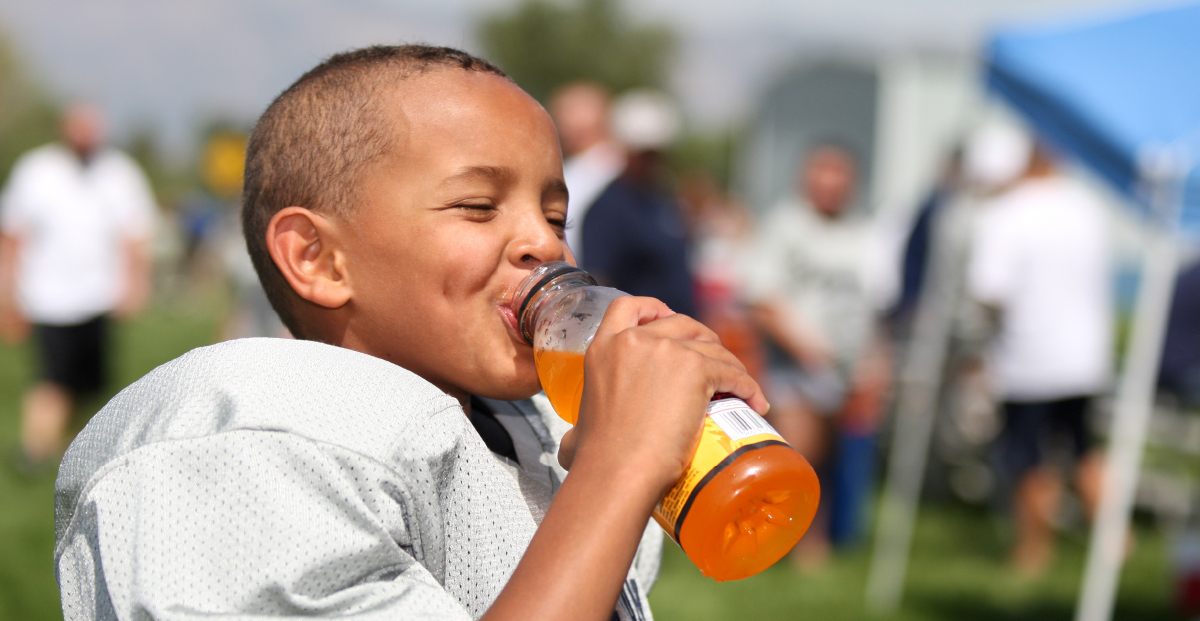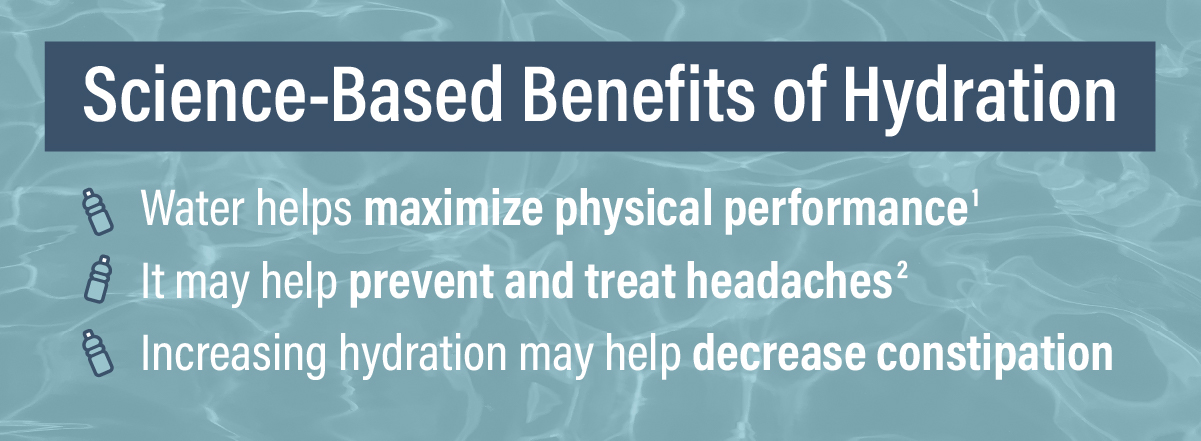
May 31, 2023
As the temperatures in Central Texas heat up, many of us find ourselves reaching for a cool drink to stay hydrated. When is it appropriate to grab a sports or electrolyte drink, and when is it best to go with water? Rhonda Mangum, FNP, helps us understand what the best drinks are for hydration.
Sports drinks are popular, sugary drinks that contain ingredients that claim to aid the body’s efforts at replenishing hydration. Sports drinks contain sugar as carbohydrates, like glucose, high-fructose corn syrup and sucrose. These sugars are meant to help the body hydrate and give the drinks their sweet flavor. Sports drinks also contain a small amount of sodium and electrolytes. “While it is used to improve taste, sodium also aids in fluid retention and absorption,” adds Nurse Mangum. Electrolytes help the body absorb water—a dehydrated body often lacks necessary electrolytes which can inhibit nerve and muscle function.
Sports drinks should encourage voluntary fluid consumption, stimulate rapid fluid absorption, supply carbohydrates for improved performance, augment physiological response, and speed rehydration. They should also be isotonic, meaning they’re in balance with the body’s fluids.
Our bodies respond very quickly to the ingestion of fluids. A person may stop drinking due to the disappearance of thirst, before rehydration takes place. This is why sports drinks can offer benefits that plain water alone cannot. Sports drinks have the appropriate balance of energy and electrolytes that will encourage rehydration to happen quickly, and are less likely to be discarded prematurely.
Sports drinks were designed for those performing intense physical activity. In fact, the original sports drink, Gatorade, was developed to help replenish carbohydrates and electrolytes in high-intensity athletes at the University of Florida in 1965. Over the years, doctors have often recommended Gatorade for people who are suffering from mild dehydration due to diarrhea or the flu to help replenish the body of important lost elements.
Is It Smart To Consume Sports Drinks?
Studies show sports drinks can help adult athletes hydrate, but there is a lack of evidence supporting the same results in children. For children who are exercising or playing sports, providing sports drinks like Gatorade could be helpful in replenishing fluid and electrolytes, but there’s no concrete evidence that proves these drinks are helpful. Nurse Rhonda says that “Sports drinks may encourage children to drink more liquid because of their sweet flavor and bright colors—in that way, sports beverages may help children hydrate more than standard water when exercising,” adding, “For children and adults simply spending time outdoors without exerting much energy, electrolytes aren’t necessary, so you can stick to water instead of Gatorade.”
How Does Soda Play In?
It’s important to note that other popular sugary drinks, like sodas, are not recommended for hydration. “While kids may be more likely to drink soda than water, studies show that sodas actually worsen dehydration,” adds Nurse Mangum.
Let’s Not Water Down the Facts: Why is H2O So Important?
Proper hydration can help improve sleep quality, brain functions and boost your energy and mood. Besides being the best way to hydrate, water has other positive effects on the body. Water has no calories, so it can also help manage body weight and reduce intake of calories and sugar. In contrast, there are 138 calories in a single can of Coke and 80 calories in one 12-ounce bottle of Gatorade.

According to Nurse Rhonda, “Fluids should be consumed with most exercise, especially if it is strenuous/fatiguing. Generally intake is adequate if thirst is quenched. Non-caffeinated sports drinks are “safe” but could be considered “unhealthy” if the calorie content is excessive. Usually, this will not be an issue with regular exercise as calorie intake and expenditure will be balanced out.”
“We should consider our activity level when we determine which drinks we should consume to replace our fluids. If we are exerting ourselves by exercising or doing yard work, electrolyte replacement drinks are a good option. However, if we are not exerting ourselves we really only need water for replacement.”
What about other drinks, such as soda? According to Nurse Rhonda, “Soda does not replenish fluids. It can actually cause more dehydration. Caffeine is a natural diuretic which means it makes more urine, causing more dehydration. Increased sugar intake also causes the cells to make more urine, causing dehydration. Artificial sweeteners affect our hydration level negatively.”
Signs of Dehydration
Symptoms of dehydration in adults and children include:
- Feeling thirsty
- Dark yellow, strong-smelling urine
- Urinating less often than usual
- Feeling dizzy, lightheaded and/or tired
- Dry mouth and tongue and cracked lips
1 National Library of Medicine
The Bottom Line
“Save your money and drink water,” said Nurse Rhonda. Water should be the primary hydration source for children and adults. Sports drinks should only be used during times of high intensity and prolonged athletic events or if it is the only way to get your child to consume enough fluids.
If you have any questions about hydration during exercise, please make sure to consult your Coryell Health primary care provider.
 Skip to content
Skip to content
